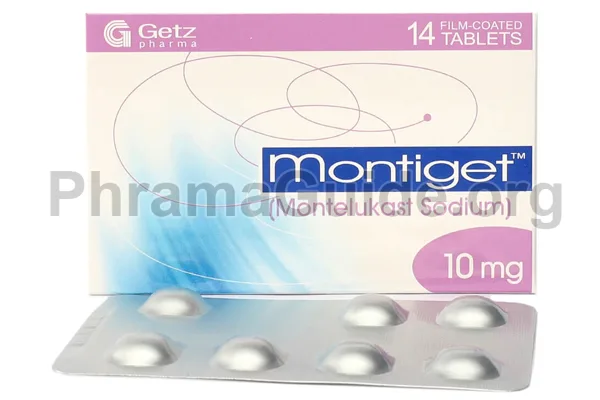Montiget is a medication primarily used to manage asthma and allergic rhinitis (hay fever). Like any medication, it can have side effects. Common and less common side effects of Montiget may include:
Common Side Effects:
- Headache: Headaches are one of the most commonly reported side effects of Montiget.
- Stomach upset: This may include symptoms like nausea, diarrhea, or abdominal pain.
- Allergic reactions: Although rare, some individuals may experience allergic reactions such as rash, itching, swelling, severe dizziness, or difficulty breathing.
- Increased liver enzymes: Elevated liver enzymes in blood tests can occur in some individuals taking Montiget.
Less Common Side Effects:
- Mood or behavioral changes: Some individuals, particularly children, have reported mood swings, anxiety, depression, or changes in behavior. It’s important to monitor patients, especially children, for such changes.
- Sleep disturbances: Sleep problems, including unusual dreams, nightmares, insomnia, and sleepwalking, have been reported in some individuals.
- Neuropsychiatric events: In rare cases, Montiget has been associated with more serious neuropsychiatric events, including aggression, agitation, suicidal thoughts, and hallucinations.
- Muscle aches or weakness: Some individuals have reported muscle-related side effects while taking Montiget.
- Hypersensitivity reactions: Although uncommon, severe hypersensitivity reactions can occur, leading to symptoms like swelling of the face, lips, tongue, or throat, hives, and difficulty breathing.
- Infections: In some cases, individuals taking Montiget may be at a slightly increased risk of respiratory infections.

What is Montiget?
Montiget is one of the leading brands of Montelukast sodium, manufactured and marketed by Getz Pharmaceuticals, Pakistan.
Montiget : Available Formulations and Strengths
Presently, Montiget is available in tablets and granules forms
Montiget Tablets : 4mg, 5mg, and 10mg strengths
Montiget Granules : 4mg/Sachet strength
What Are The Possible Drug Interactions of Montiget?
- Phenobarbital, Phenytoin, and Rifampin: These drugs, known as enzyme-inducing antiepileptic medications, may decrease the effectiveness of Montiget by increasing its metabolism and reducing its blood levels.
- Corticosteroids: Combining Montiget with oral or inhaled corticosteroids can enhance its anti-inflammatory effects and is often done in the management of asthma.
- Anti-allergic medications: Montiget is sometimes used in combination with antihistamines and decongestants to manage allergic rhinitis. It can complement their effects.
- Warfarin: Montiget does not appear to have a significant impact on warfarin’s blood-thinning effects, but it’s still essential to monitor the International Normalized Ratio (INR) in individuals taking both drugs.
- Theophylline: Some studies suggest that Montiget may enhance the bronchodilator effects of theophylline in individuals with asthma.
- Propranolol: Combining Montiget with propranolol (a beta-blocker) may lead to a slight decrease in the effectiveness of propranolol, but this interaction is usually not clinically significant.
- Erythromycin and Azithromycin: These antibiotics may slightly increase the concentration of Montelukast in the blood.
- Aspirin: In some cases, Montiget may be used in conjunction with aspirin for the management of aspirin-exacerbated respiratory disease (AERD).

Leave A Comment